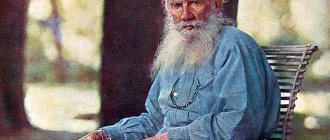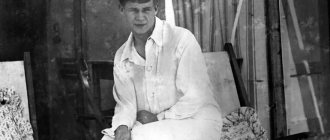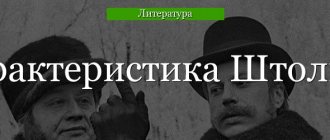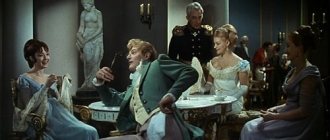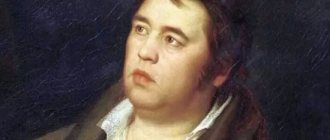Article menu:
- Marriage to Lisa Meinen
- Battle of Austerlitz
- Life after wife's death
- Meeting with Natasha Rostova
- Return to military service
- Wounded in the Battle of Borodino and its consequences
L.N. Tolstoy never showed himself to be an unprincipled writer. Among the variety of his images, one can easily find those to which he had a positive attitude, with enthusiasm, and those to which he felt antipathy. One of the characters to which Tolstoy was clearly partial was the image of Andrei Bolkonsky.
Marriage to Lisa Meinen
For the first time we meet Bolkonsky in Anna Pavlovna Sherer. He appears here as a guest bored and tired of all the social society. In his internal state, he resembles a classic Byronic hero who does not see the meaning in secular life, but continues to live this life out of habit, while experiencing internal torment from moral dissatisfaction.
At the beginning of the novel, Bolkonsky appears before readers as a 27-year-old young man married to Kutuzov’s niece, Lisa Meinen. His wife is pregnant with their first child and is due to give birth soon. Apparently, family life did not bring happiness to Prince Andrei - he treats his wife rather coolly, and even tells Pierre Bezukhov that getting married is destructive for a person. During this period, the reader sees the development of two different aspects of Bolkonsky’s life - secular, associated with the arrangement of family life and military - Prince Andrei is in military service and is an adjutant to General Kutuzov.
Battle of Austerlitz
Prince Andrei is full of desire to become a significant person in the military field; he places great hopes on the military events of 1805-1809. - according to Bolkonsky, this will help him lose the feeling of the meaninglessness of life. However, the very first wound significantly sobers him up - Bolkonsky reconsiders his priorities in life and comes to the conclusion that he will be able to fully realize himself in family life. Having fallen on the battlefield, Prince Andrei notices the beauty of the sky and wonders why he had never looked at the sky before and not noticed its uniqueness.
Bolkonsky was not lucky - after being wounded, he became a prisoner of war of the French army, but then he has the opportunity to return to his homeland.
Having recovered from his wound, Bolkonsky goes to his father’s estate, where his pregnant wife is. Since there was no information about Prince Andrei, and everyone considered him dead, his appearance was a complete surprise. Bolkonsky arrives home just in time - he finds his wife giving birth and her death. The child managed to survive - it was a boy. Prince Andrei was depressed and saddened by this event - he regrets that he had a cool relationship with his wife. Until the end of his days, he remembered the frozen expression on her dead face, which seemed to ask: “Why did this happen to me?”
Life after wife's death
The sad consequences of the Battle of Austerlitz and the death of his wife were the reasons why Bolkonsky decided to refuse military service. While most of his compatriots were called up to the front, Bolkonsky specifically tried to make sure that he would not end up on the battlefield again. To this end, under the guidance of his father, he begins activities as a militia collector.
We invite you to familiarize yourself with the summary of the novel by L.N. Tolstoy’s “Resurrection” – a story of moral transformation.
At this moment there is a famous fragment of Bolkonsky’s vision of an oak tree, which, in contrast to the entire greening forest, argued the opposite - the blackened oak trunk suggested the finitude of life. In fact, the symbolic image of this oak embodied the internal state of Prince Andrei, who also looked devastated. After some time, Bolkonsky again had to drive along the same road, and he saw that his seemingly dead oak tree had found the strength to live. From this moment, Bolkonsky's moral restoration begins.
Dear readers! If you want to find out who wrote the work “Anna Karenina”, we bring to your attention this publication.
He does not stay in the position of militia collector and soon receives a new assignment - work in the commission for drafting laws. Thanks to his acquaintance with Speransky and Arakcheev, he is appointed to the position of head of the department.
At first, this work captivates Bolkonsky, but gradually his interest is lost and he soon begins to miss life on the estate. His work on the commission seems to Bolkonsky to be idle nonsense. Prince Andrei increasingly catches himself thinking that this work is aimless and useless.
It is likely that during the same period, Bolkonsky’s internal torment led Prince Andrei to the Masonic lodge, but judging by the fact that Tolstoy did not develop this part of Bolkonsky’s relationship with society, the Masonic lodge did not spread and influence the path of life.
Andrey Bolkonsky
Andrey Bolkonsky. Actor V. Tikhonov. Film "War and Peace". 1967
Andrei Bolkonsky is the main character of the epic novel “War and Peace”, one of the positive characters of L.N. Tolstoy. A hereditary prince, a brilliant officer, he is in search of his own path, considering his main purpose to be service to the Fatherland. Bolkonsky's prototypes could have been three real people who lived during the War of 1812.
Description of the hero
Origin, appearance, character
The ancestors of Prince Andrei Bolkonsky were representatives of the highest aristocracy from an old, noble family of nobles. Nothing is known about his mother; perhaps she died when the children were still small. Andrei and his sister Marya were raised by their father, a rather tough man with a stubborn character. Andrei's relationship with his father has been tense since childhood. As he grew older, he no longer made attempts to get closer to his stern parent, because he still encountered callousness and misunderstanding. He had the warmest relationship with his sister. Andrei felt sorry for Marya, who devoted her entire life to serving the capricious Count Bolkonsky.
The first impression of Bolkonsky can be formed from the words of Tolstoy himself: “... Prince Bolkonsky was small in stature, a very handsome young man with definite and dry features. Everything in his figure, from his tired, bored look to his quiet, measured step, represented the sharpest contrast with his little lively wife...”
Another characteristic of Bolkonsky is presented in a conversation with Pierre: “his dry face kept trembling with the nervous revival of every muscle; the eyes, in which the fire of life had previously seemed extinguished, now shone with a radiant bright shine.” Bolkonsky was dry and unapproachable towards those who aroused his antipathy. These included bureaucrats and careerists, soulless, selfish individuals. In his relations with ordinary people, the prince was sincere and friendly. He had a talent for a special instinct for people with the absence of falsehood, deceit and hypocrisy.
Bolkonsky gave the impression of a man endowed with an extraordinary mind, who was accustomed to constantly analyzing both external events and mental experiences. His desire for government activity is due not only to personal vanity, but also to the desire to benefit society and serve for the good of his people and homeland. He can be called a crystal honest, but slightly confused patriot who never ceases to search for the meaning of life and answers to the questions that tormented him.
Battle of Austerlitz
Since Andrei was raised by his father as a general-in-chief, who served in Catherine’s times, his zeal for military service is understandable. Trying to prove himself in military affairs at any cost, he submitted a petition to the front back in 1805. Another reason was Andrei’s fatigue from a secular society that was completely false and saturated with hypocrisy. Even his pregnant wife Lisa, to whom he had long lost interest, could not influence his decision: “I love nothing but fame, human love. Death, wounds, loss of family, nothing scares me.”
In the army, Bolkonsky is appointed to the post of adjutant to Kutuzov. Understanding the importance of the upcoming Battle of Austerlitz, he dreams of glory, but does not exclude his own death. At the most critical moment, when, under pressure from the advancing French, confusion began in the Russian troops, ready to retreat, Andrei picks up the fallen banner from the ground and deploys the soldiers to attack.
His heroic act, caused, rather, by ambition and a thirst for glory, ends with a serious injury. Bolkonsky falls, and for the first time in his life a huge, endless sky opens up to him. He looks into it and begins to understand what the highest value of life is: “How come I haven’t seen this high sky before? And how happy I am that I finally recognized him. Yes! It’s all empty, it’s all deception, except this endless sky.” And he also sees Napoleon looking around with satisfaction at the battlefield, filled with the groans of wounded and dying soldiers.
Meeting with the French Emperor
Andrei is captured, where he meets Napoleon again. Apparently, the courage of the Russian officer left in Bonoparte’s soul some feeling understandable to him alone. By his order, Bolkonsky is transferred to a hospital, and then completely released. Andrei should be grateful to his idol, but the memory of his cynicism on the field of the Battle of Austerlitz dispels his sacred awe of this narcissistic tyrant to dust.
Returning to the estate, Andrei finds his dying wife. Even his born son, Nikolenka, cannot prevent the depression that is increasingly taking hold of him. Bolkonsky decides that he is done with his service and will not go to war again. He decides to devote his entire life to his family and raising his child. A meeting with Pierre finally convinces him that he is making the right choice.
Two meetings with an oak tree
Nature in Tolstoy’s novel plays the role of not only a beautiful background. There are episodes where it helps to better understand the state of the hero, pushing him to realize his path and place in life. This was the case in the life of Andrei Bolkonsky, who had the opportunity to drive past an old, century-old oak tree twice, at different times.
At the first meeting, the tree reminds Andrey of a stern, gloomy and sick giant elder: “It was a huge oak tree, two girths wide, with branches that had apparently been broken off a long time ago and with broken bark overgrown with old sores.” The oak tree was indifferent to “the charm of spring and did not want to see either spring or the sun,” as if it had lost faith in all good things. Bolkonsky involuntarily compared himself with this oak tree and discovered how similar they were at that moment! The same soul, wounded after the death of his wife and from unfulfilled glory, the same lack of faith in something better, which, in his opinion, will never happen to him.
But Andrei had no idea that in his life there would be another meeting with this oak tree. It happened when he was returning from the Rostovs from Otradnoye, where one night he heard Natasha’s admiration for nature. Bolkonsky looked at the oak tree in amazement and could not believe his eyes. He came to life and stood “all transformed, spread out like a tent of lush, dark greenery, thrilled, slightly swaying in the rays of the evening sun. No gnarled fingers, no sores, no old grief and mistrust - nothing was visible.”
Such a powerful surge of happiness washed over Andrei that he wanted to live again: “I need everyone to know me, so that my life doesn’t go on for me alone, so that they don’t live like this girl, regardless of my life, so that it’s for everyone.” reflected and so that they all live with me!”
Relationship with Natasha Rostova
Having decided to end his military career, Andrei, in order to dispel the blues that sometimes creep in, goes to the Rostovs in Otradnoye. There he sees Natasha for the first time - a girl who knows how to simply rejoice in the fact that she lives, that the sun is shining in the clear sky and that close and dear people are nearby. Andrei, unaccustomed to such natural spontaneity, admires this girl, unlike anyone else, and does not yet know that she will change his destiny forever.
The next meeting at Natasha's first ball marked the beginning of their relationship. A handsome, stately officer circled a fragile and tender partner in the center of the sparkling hall, who shone with such genuine happiness that she aroused the admiration of the entire Moscow elite.
The young people began dating and increasingly realized that they were united by something more than mutual sympathy. Both Natasha and Andrey were characterized by a friendly attitude towards the world and others; both were indifferent to secular patterns and conventions. The relationship developed, and Natasha already saw her husband in Bolkonsky. Everything was heading towards announcing the date of the upcoming engagement.
Old Prince Bolkonsky disapproved of his son's choice. He considered his bride too young and inexperienced and could not trust her with raising his grandson. Thus, despite the announced engagement, the wedding was postponed for a year.
War of 1812 and the death of Bolkonsky
Young, inexperienced Natasha cannot stand the separation and falls into the skillfully placed nets of the handsome Anatole, a cynical and immoral libertine. After the termination of the engagement, Bolkonsky again goes to the front. “I said that a fallen woman must be forgiven, but I did not say that I can forgive. “I can’t,” these are his last words to Pierre, meaning a complete break in relations with Natasha Rostova.
During the Battle of Borodino, Prince Bolkonsky is mortally wounded in the stomach. By chance, he ends up with the Rostovs and on one of their carts, along with other wounded, leaves Moscow. A meeting with Natasha once again turns Andrei’s life upside down. Both understand that they will never be together again, but they also feel something else - how dear they are to each other. Until Bolkonsky’s last breath, Natasha selflessly looks after him, mentally begging for forgiveness from this man.
Andrei forgives both his rival Anatole and his beloved Natasha Rostova. His hatred remains in the past, so by forgiving the whole world, he finds harmony with himself. Overcoming his horror of death, he realizes that by leaving life, he is discovering something new, unfamiliar and great. With this same earthly life, Andrei’s connection is becoming weaker and weaker every minute. All the troubles, problems, desires that weighed so heavily on him recede somewhere into the background, becoming insignificant in the face of the mysterious thing that awaits him ahead.
His long and painful death was sent down to him so that he would have time and be able to spiritually cleanse himself, reevaluate life, find harmony with the world and accept it humbly, as something inevitable and natural: “To die means... to return to the common and eternal source” .
The role of the hero in the work
Almost all the characters in L.N. Tolstoy are doomed to search for a long and difficult path of truth and justice, which should lead them to an understanding of the universal problems of the universe. His hero, Prince Andrei Bolkonsky, also went through such a “dear honor.” His short fate was a path to death, during which he only occasionally came into contact with the warm beating of life. Using his example, Tolstoy sought to show that there is no need to be afraid to change anything, because life itself consists of ups and downs, mistakes and their correction.
Despite the desire for glory, Andrei Bolkonsky remains the greatest hero of Russian literature, a true patriot of the Fatherland, the care of which is his duty. Using the example of two main characters - Pierre and Andrei, Tolstoy shows that, despite their different paths, both of them are the best representatives of high society. The search for the meaning of life leads them to the same understanding - this meaning lies in unity with the people, in absolute love for this people.
Character development as the story progresses
Initially, according to Tolstoy’s plan, this hero was assigned a rather modest role. The vain individualist had to merge with the main mass and fall on the battlefield. But in the process of working on the novel, the author forced his character to go through a huge path of evolution.
In the battle of Austerlitz, Bolkonsky was filled with a thirst for accomplishment of a feat. He understands that he is being given a unique chance. He takes the banner, imagining that by this act he is saving the Russian army. But a sudden injury ends his ambitious dreams. The greatest sky that opened to the hero leads him to the understanding that in comparison with real life, all these military battles are insignificant and meaningless. He returns to the estate and decides to devote himself to his family.
Under the influence of a series of events - injury, subsequent captivity and the death of his wife, Andrei falls into deep depression. At this time, his first meeting with an oak tree takes place, which makes the hero think that life is over for him. A gradual return to life occurs after meeting Natasha in Otradnoye. Bolkonsky is overcome by a thirst for government activity. But communication with a prominent figure of that time, Speransky, exposes the entire falsity of the bureaucratic apparatus, and he again experiences disappointment.
After breaking up with Natasha, Bolkonsky re-enlists in the army. In his opinion, only by being close to ordinary soldiers, and not at headquarters, will he be able to benefit the Fatherland. Having become a regiment commander, Andrei becomes even closer to the people, who respectfully call him “our prince.” There is a spiritual renewal of Andrei, the main role in which belongs to ordinary Russian soldiers.
A severe wound during the Battle of Borodino gives Andrei a passionate desire to live. At the dressing station, his painful search for the truth and summing up his own life begin: “Why was I sorry to part with my life? There was something in this life that I did not understand and do not understand.” At these moments, the thought suddenly comes to him about the enormous, all-forgiving love for people that he would bear to them if he continued to live.
When Natasha is next to him, Prince Andrei comes to an idealistic understanding of love and death: “Love is God, and to die means for me, a particle of love, to return to the common and eternal source.” Just before his death, he has a dream in which, experiencing horror before death, he fights for life with his last strength. But death wins, and Bolkonsky wakes up with the understanding that this is the desired liberation. With this thought, the prince leaves this world.
Tolstoy leads his hero along the difficult path of moral quest. Bolkonsky lived a worthy life and accepted a worthy death, leaving this world a happy man. “This was that last moral struggle between life and death, in which death won.” Analyzing the spiritual world of Prince Andrei and his activities, one can assume: if he had not died, his subsequent quest would have led him to the Decembrists.
The author's attitude towards the hero
Lev Nikolaevich Tolstoy is characterized by the fact that he almost always expresses a certain attitude towards his heroes. Perhaps this is due to the fact that the writer very clearly distinguishes between the concepts of good and evil, which helps to better understand the actions of his characters.
Bolkonsky is close to the author, if only because he connects his life’s purpose with serving the people. He takes care of the peasants and even gives some of them freedom by giving them land. For the rest, corvee is replaced by quitrent. This quality of closeness to the people was very valuable for Tolstoy himself, whose views coincided with his hero.
Tolstoy also shows his positive attitude towards Bolkonsky by portraying him as the best representative of the aristocracy. He endows this image with the remarkable features of a nobleman-patriot, ready to give his life for the Fatherland. Tolstoy ends the path of his quest with heroic death in the name of saving his homeland.
Even the death of the hero is connected with the worldview philosophy of Tolstoy himself. Within the boundaries of the novel, the writer elevates earthly love with all its mistakes over Christian love. This contains the contradiction of Andrei’s spiritual values, which remained completely incomprehensible to him. His best friend Pierre Bezukhov will have to continue the search for this truth.
Prototypes
At one time, local historian Nikolai Frolov was engaged in the search for prototypes of Andrei Bolkonsky. In his opinion, the prototypes of the prince could be two people. One of them is a young officer of the guards regiment, Pyotr Mikhailovich Volkonsky, who led the attack of the reserve battalion in the Battle of Austerlitz.
He called Prince Dmitry Nikolaevich Golitsyn the second prototype. During the war with Napoleon, this officer of the hussar regiment was seriously wounded in the battle of Borodino. He died in 1812, being the same age as the protagonist.
There are many similarities in the biographies with Lieutenant General Nikolai Tuchkov. He was also mortally wounded in the Battle of Borodino and, after much suffering, died in Yaroslavl.
Film adaptations of the hero
Throughout its existence, the famous novel by L.N. Tolstoy has gone through five film adaptations. The first film was shot in America and was released in 1959. The role of Andrei Bolkonsky was played by Hollywood actor Mel Ferrer. For the second time, viewers were introduced to the screen version of the novel in 1967. This four-part film became a classic of Soviet cinema, receiving the Main Prize at the Moscow International Film Festival. It became one of the first Soviet films to win an Oscar.
The film was directed by the already well-known actor and director Sergei Fedorovich Bondarchuk. The large-scale project was supervised by the USSR Ministry of Culture, headed by E. Furtseva. Actor Vyacheslav Tikhonov was 34 years old at that time, and he already had such films as “The Young Guard” and “It Was About Penkov” behind him. Dreaming of getting the role of Andrei, he approached Bondarchuk and tried to explain that he had his own understanding of this complex character. One day he directly addressed the director with a question: “Sergey, how do you imagine Andrei Bolkonsky?” He looked at me and said: “Well, Slava, Bolkonsky is completely different!”
Tikhonov did not argue and went to another city to star in the film “Optimistic Tragedy.” In the meantime, Innokenty Smoktunovsky was cast in the role of Bolkonsky, who soon abandoned it because of the role of Hamlet. The next confirmed actor was Oleg Strizhenov, who also turned down the role. Then Furtseva insisted that only Tikhonov play Bolkonsky.
Bondarchuk managed to “fashion” the soft Tikhonov into the iron and vain aristocrat Bolkonsky. Tikhonov, in turn, with his internal qualities and excellent external physical form, managed to prove in this film that this is what Prince Andrei is. A decent, intelligent, highly spiritual and moral person, at the same time, not without some melancholy. Bolkonsky, performed by Tikhonov, is a romantic rebel, who, despite outward prosperity, is overcome by storms, “as if there is peace in the storms.”
In 1972, another version of the film produced in Great Britain was released, in 2007 - “War and Peace”, a joint production of Russia, France, Germany, Italy and Poland. And, forty years later, in 2021, the BBC again released a film version of Leo Tolstoy’s novel. The series turned out to be unusually atmospheric, although with some “Anglican” touch.
Literature
- Timrot A.D. Heroes and images of the novel “War and Peace”. – Tula, 1966
- Feuer K.B. Genesis of "War and Peace". St. Petersburg, 2002.
- Dolinina N. Through the pages of “War and Peace”: Notes on the novel by L.N. Tolstoy "War and Peace". – L.: Children's literature, 1978.
- All the heroes of works of Russian literature: School curriculum: Dictionary-reference book. – M.: Olimp, 2002.
- Stakhorsky S.V. Encyclopedia of literary heroes M.: Agraf, 1997.
- Kurlyandskaya G.B. The moral ideal of the heroes of L.N. Tolstoy and F.M. Dostoevsky. – M., 1988.
Meeting with Natasha Rostova
At the New Year's ball in 1811, he sees Natasha Rostova. After meeting the girl, Prince Andrei realizes that his life is not over and he should not dwell on Lisa’s death. Bolkonsky's heart is filled with love in Natalya. Prince Andrei feels natural in Natalya’s company - he can easily find a topic of conversation with her. When communicating with a girl, Bolkonsky behaves at ease, he likes the fact that Natalya accepts him for who he is, Andrey does not need to pretend or play along. Natalya was also captivated by Bolkonsky; she found him attractive both externally and internally.
Without thinking twice, Bolkonsky proposes to the girl. Since Bolkonsky’s position in society was impeccable, and besides, his financial situation was stable, the Rostovs agree to the marriage.
The only person who was extremely dissatisfied with the engagement was Prince Andrei's father - he persuades his son to go abroad for treatment and only then deal with the affairs of marriage.
Prince Andrei gives in and leaves. This event became fatal in Bolkonsky’s life - during his absence, Natalya fell in love with the rake Anatoly Kuragin and even attempted to escape with the rowdy.
He learns about this from a letter from Natalya herself. Such behavior unpleasantly struck Prince Andrei, and his engagement to Rostova was terminated. However, his feelings towards the girl did not fade away - he still continued to love her passionately until the end of his days.
Return to military service
To numb the pain and take revenge on Kuragin, Bolkonsky returns to the military field. General Kutuzov, who has always treated Bolkonsky favorably, invites Prince Andrei to go with him to Turkey. Bolkonsky accepts the offer, but Russian troops do not stay in the Moldavian direction for long - with the beginning of the military events of 1812, the transfer of troops to the Western Front begins, and Bolkonsky asks Kutuzov to send him to the front line. Prince Andrei becomes commander of the Jaeger regiment. As a commander, Bolkonsky demonstrates himself at his best: he treats his subordinates with care and enjoys significant authority among them. His colleagues call him “our prince” and are very proud of him. Such changes in him were realized thanks to Bolkonsky’s refusal of individualism and his merging with the people.
Bolkonsky's regiment became one of the military units that took part in military events against Napoleon, in particular during the Battle of Borodino.
Reassessment of values in Bolkonsky's life
After being wounded, the hero completely changes his priorities. It becomes clear to him that the main value in life is love. He returns to the family he left, having lost interest in his wife. But Lisa dies during childbirth, leaving him with a son, Nikolenka. Andrey completely dissolves in his son and spends as much time as possible with him. Then he meets Natasha Rostova. She shows Bolkonsky what feelings are, thanks to her he learns what true love is. But, having learned this feeling, Andrei continues to pursue the meaning of life, trying to find it in something new. Bolkonsky cannot “simply exist” even with great and pure love.
Essay 3
Andrei Bolkonsky is the main character of the work “War and Peace”, written by Leo Tolstoy, along with Pierre. At the beginning of the novel, there is a struggle for the title of protagonist between Pierre and Andrei, between the sons of Count Bezukhov and Count Nikolai Bolkonsky. But despite this, Pierre and Andrei were friends and there was respect for each other between them.
Savor
Andrei is a prince, the son of Count Nikolai Bolkonsky. His father, Nikolai, is one of the most influential and noble people of the Russian Empire of the 18th century.
Andrei lives in St. Petersburg and is married to the niece of the commander-in-chief of the Russian Empire, Kutuzov. At the beginning of the novel, Andrei's wife, Lisa, a little princess, was pregnant, and some clairvoyant predicted her death during childbirth. Our today's hero has the highest position in the society of that time, he is so valued, so respected, but he does not like this life. It was at this time that Andrei had already firmly decided that he was going to war. By the way, he served as an adjutant under Kutuzov. His wife, the beautiful Lisa, does not agree with her husband’s decision and tries in every possible way to keep him from the war. Even one evening, when Pierre was their guest, they quarreled over this issue. But despite everything, Andrei and Lisa love each other very much.
In 1805, Andrei Bolkonsky leaves for the war with Bonaparte, leaving his pregnant wife in the village with his father and sister (Marya Bolkonskaya). He serves there for two years and in 1807 is captured by the French, and his family thinks he is already dead. But unexpectedly for everyone, our hero returns to his father’s village, right during the birth of his wife. Unfortunately, Lisa dies, but her son, little Nikolai, remains alive.
After the death of his wife, the former adjutant already loses interest in life and goes to live alone. Later he returns to St. Petersburg, where he becomes a member of the drafting of laws. But soon Andrei loses interest in the legislative branch and returns to the village again. There he follows the example of his friend, Pierre, and becomes a Freemason.
Andrey and Natasha Rostova
One day at a ball, our hero meets the main character of the novel, the daughter of Count Rostov, Natasha. Andrey asks Natasha for her hand and she agrees. But Count Bolkonsky interferes with the matter and forces his son to go abroad for treatment. While Andrei was abroad and receiving treatment, Natasha falls in love with Anatoly Kuragin and he cannot forgive Natasha.
Andrei, in order to forget Natasha, leaves for service in Turkey, and then goes to the Patriotic War with France in 1812. Andrei commands the Western Army and is an excellent commander, winning victory after victory. His team participates in the Battle of Borodino with Napoleon, and in this battle he is wounded, which turns out to be fatal. The wounded princes are transferred to Moscow, where he accidentally ends up in the Rostovs' house and is cared for by Natasha. But nothing can save him and he dies.
This is how the life of Andrei Bolkonsky turned out in the work “War and Peace”. There was a struggle between him and Pierre for the title of protagonist of the novel, but for some reason Lev Nikolaevich chose Count Bezukhov.
Option 2
The Russian intelligentsia is almost always looking for its place in life. So Andrei Bolkonsky is one of Leo Tolstoy’s favorite heroes. Hereditary nobleman, prince, career officer and simply handsome. The first time we meet him is in the salon of socialite Anna Petrovna Sherer. He's going to war. He was tired of the lazy St. Petersburg society, vegetating at balls and social events. He dreams of accomplishing a feat. The fact that his wife is pregnant does not stop him. He plans to take her to the village, to his father.
Fortune favors him - he is appointed adjutant to the commander-in-chief himself. This takes him one step closer to his dream. And he dreams of fame and power. He dreams of being like Napoleon Bonaparte. When he was in the battle of Toulon, with a banner in his hands, he led the soldiers behind him. Prince Andrei decided to repeat this at the Battle of Austerlitz.
But he was seriously wounded. As he lay on the battlefield, his eyes fixed on the bottomless sky, Napoleon approached him and said something like: “What a wonderful death of a real warrior.” And Andrei suddenly realized that he was not at all interested in this short Corsican with global ambitions.
On the verge of life and death, it was as if his eyes had been opened. He understood the meaning of life, why he lives. He also realized that his idol is actually an ordinary killer who sends his soldiers into the meat grinder to satisfy his ambitions.
He decides to return home to his father. And just in time, during childbirth, his wife dies. Andrey decides to take up a peaceful life. He just wants to live with his father, sister, and take care of his son. He also does his own housekeeping. He made life easier for his peasants - he replaced corvée with quitrent. For him, this means that at 31, life is over. But he is still deeply depressed.
The prince's best friend Pierre Bezukhov asks to invite a young girl, Natasha Rostova, to dance at the ball. The prince liked her for her beauty, her childish spontaneity, and her ability to find the unusual in ordinary things (the moon in the night sky). It seemed that happiness was nearby. But it passes by again.
Yes, Natasha was mistaken in believing the ladies' man Kuragin. But the proud prince did not forgive her. It was as if the light of hope for happiness had gone out. And again a gray haze surrounds the prince. He keeps rushing around the world, cannot find a place for himself in life. He decides to take up government activities. But participation in the commission leads him to the conclusion that it is pointless. It's all talk and nothing useful.
His further fate is decided by his old acquaintance, Napoleon. His army invades Russian territory. And Prince Andrei, like a true patriot, returns to the active army. But not to headquarters. He goes to the front line.
He no longer wants any exploits or glory. Just ordinary military service. On the eve of the Battle of Borodino, he meets with his best friend Pierre Bezukhov. Prince Andrei finally understands that the outcome of the battle is determined not only by the genius of this or that commander. The outcome of the battle is decided by ordinary soldiers and officers. A commander without an army is nothing without a wand.
In the face of death, he finally understands that he must be simpler with loved ones, not so arrogant, and be able to forgive their mistakes. After all, the prince himself is probably not without sin. Then simple human happiness would smile at him.
Bolkonsky's disappointments
For the first time, Andrei Bolkonsky experienced a feeling of disappointment at the moment when he lay under the Austerlitz sky and thought about death. Seeing his idol, Napoleon Bonaparte, standing next to him, Andrei for some reason did not experience the delight from his presence that he had previously considered possible. At this moment, Napoleon’s interests seemed extremely insignificant to him, and the emperor himself seemed petty and vain. All Bolkonsky’s thoughts were now directed to the high, fair and kind sky. What previously seemed ideal turned out to be just a dummy. In pursuit of his fictitious ideal, Bolkonsky did not notice so many important things.
Finished works on a similar topic
Coursework: Paths of search for Andrei Bolkonsky 460 ₽ Abstract Paths of search for Andrei Bolkonsky 220 ₽ Test paper: Paths of search for Andrei Bolkonsky 250 ₽
Receive completed work or specialist advice on your educational project Find out the cost
After returning home, Andrei Bolkonsky finds his wife Lisa in labor. But the woman dies. After the death of his wife, Bolkonsky comes to the realization that he himself is partly to blame for what happened. He regrets his attitude towards Lisa. Andrei understands that he was too arrogant, too proud, too far from her, these thoughts bring Bolkonsky suffering.
He promises himself to never fight again, to live quietly, peacefully, calmly. Pierre Bezukhov is trying to revive his friend to life, he tells him about Freemasonry, that the salvation of the soul lies in serving people. However, to all this Andrei replies that in life he knows only two real misfortunes - illness and remorse. According to Bolkonsky, the absence of these two evils is happiness.
Bolkonsky, preparing for the Battle of Borodino, painfully goes through the life events that happened to him. Tolstoy describes the state of Prince Andrei as follows: “The three main sorrows of his life in particular stopped his attention. His love for a woman, the death of his father and the French invasion that captured half of Russia.” He realizes that the glory that worried him some time ago, the love that he once did not take seriously, and the fatherland, which is currently under threat, are “false images.” All this used to seem great, divine, unattainable to Andrei Bolkonsky, filled with deep meaning. Now he has reconsidered his view of these things. All this suddenly turned out to be “simple, pale and stupid” for the hero of the work.

